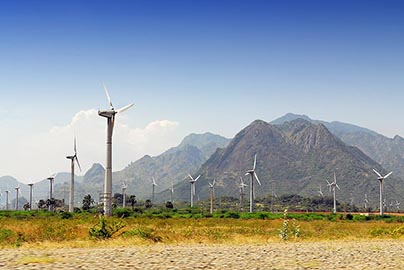Climate Change recognition and energy inefficiencies
Climate change and carbon emissions feature in most of India’s political party’s manifestos, as the electorate votes to decide on the Government for the next 5 years. However, tackling climate change and reversing the recent growth in India’s CO2 emissions will take more than lip service from politicians hoping to win votes. We discuss the importance of following through on eco-friendly and carbon neutral plans.
Changing weather patterns and health problems related to air quality, are just two of the many issues affecting India – and other countries – today. Taking steps to improve the environment aren’t always easy and nor do they always garner the required support, at least in the first instance.
However, some four years after signing the Paris Agreement, many of India’s political parties, including the BJP and INC, have included plans to tackle Climate Change in their political manifestos. This is a major development from the 2014 elections and shows that the topics of air pollution, water scarcity and carbon emissions, are clearly becoming more important.
For the BJP, air pollution is treated as a priority. It states it would introduce a clean air programme across 102 cities, with a target of reducing pollution by 35% over the next five years. For INC, air pollution was also considered important enough to discuss, as it said it would be named as a national public health emergency. However, no specific targets were outlined.
They are not alone in detailing plans to reduce air pollution, with other parties also promising investment in reducing air pollution and using cleaner, renewable energy.
Indeed, the use of renewable energy in technological advancements that support India’s economic growth forecasts, would most certainly have an impact in a relatively short timeframe, due to the sheer size of the country and its population.
Of course, just how far any policies relating to reversing climate change and helping to improve the health of India’s many inhabitants will actually be further developed and implemented, remains to be seen.
India’s CO2 emissions rise
Shortly before India’s political manifestos were released and the electorate embarked on a series of votes that will select the next Government, the latest Global energy and CO2 Status report from the International Energy Agency was published. It showed that India’s carbon emissions rose by 4.8% in 2018 from 2017.
That increase in emissions was higher than both the US and China, which are the world’s two largest carbon emitters. The rise in India’s carbon emissions, meanwhile, was attributed to increased consumption of coal.
To put the near 5% increase in CO2 emissions into context, the global average CO2 rise in 2018 was calculated at 1.7%, less than half the increase across India. India is currently the fourth largest emitter of CO2 and its increased use of coal in 2018, was part of a wider trend in which coal accounted for 30% of all global emissions last year.
Of course, India isn’t the only country where emissions rose. However, its notable that India’s use of coal grew by more than any other country. In fact, the report shows coal use fell in the US, Europe and Japan. It’s also interesting that the IEA did point out that despite the huge increase in CO2 emissions, per capita emissions in India are below the global average.
That suggests the country is moving in the right direction and with some further improvements, including even less reliance on coal for energy, the country can help to make a real difference to lowering global CO2 emissions.
Carbon neutrality
Together, these two important developments highlight the growing importance of tackling Climate Change and creating, then effectively promoting, the use of sustainable, low carbon emitting energy projects, businesses and general practices.
At Red Ribbon we’re already doing our part to promote cleaner air and sustainable energy solutions. But our ambitions don’t stop there. We’re also interested in supporting India’s economy and creating eco-friendly, sustainable investment options for those interested in securing their share of returns from the still strong growth across India’s various industries.
Eco Hotels is one such investment opportunity that we’re proud to be part of. The first of its kind, this carbon-neutral hotel brand has sustainability and emissions-controlled planning at its core.
Not only does it provide domestic and international travellers the opportunity to visit parts of India in a cost-effective way, the brand has also been designed to ensure it gives back to more than just India’s financial economy.
Sustainability is increasingly important to India’s future, as it is across the globe. Eco Hotels gives investors the chance to truly diversify their portfolio, while being part of an expanding eco conscious that tomorrow’s business leaders will support and develop even further.
[nectar_btn size="large" open_new_tab="true" button_style="regular" button_color_2="Accent-Color" icon_family="none" url="https://ecohotelsglobal.com/" text="Learn More About Eco Hotels"]
Red Ribbon CEO, Suchit Punnose said:
There are an increasing number of developments pointing to the importance of tackling climate change and lowering CO2 emissions. These details have always been important to us at Red Ribbon and are more than a consideration when we create new businesses and investment opportunities.
Eco Hotels is just one way that we continue to support and promote sustainable living and investing across India and we know it will be among those businesses that stand the test of time in India. Not just as a brand, or even as an example of sustainability for the economy and for investors, but also as a way of creating new businesses, by always keeping the future of the land it’s built on in mind.








Leave a Reply